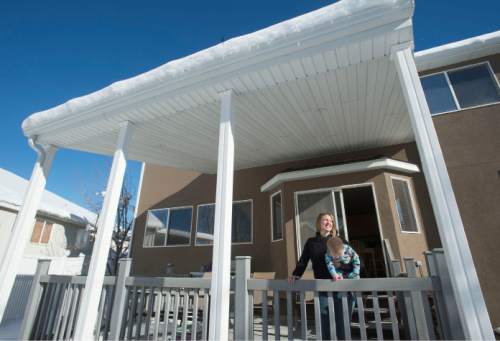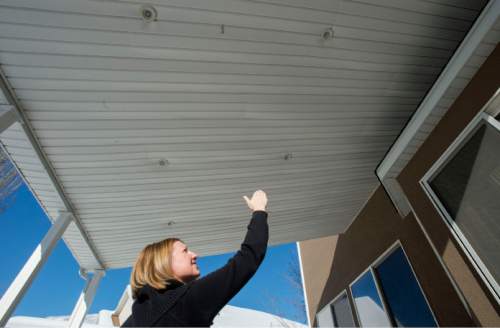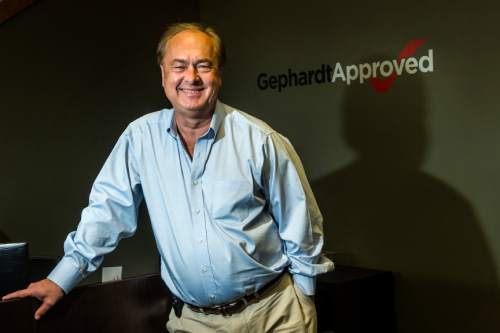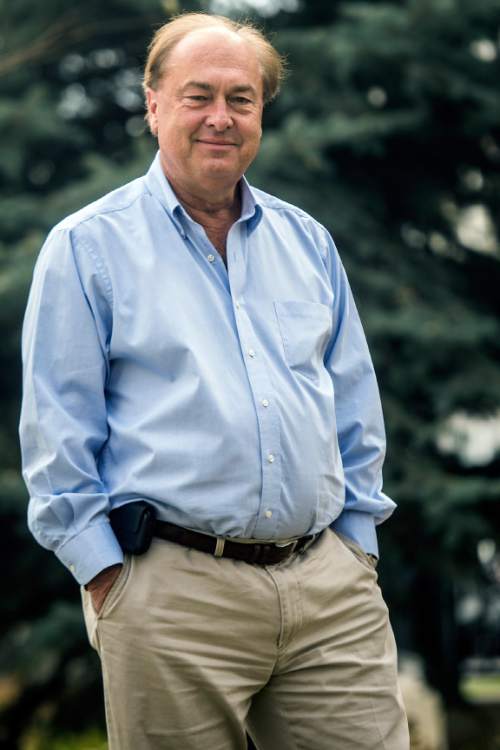This is an archived article that was published on sltrib.com in 2015, and information in the article may be outdated. It is provided only for personal research purposes and may not be reprinted.
For more than a decade, countless Utahns "got" Bill Gephardt, siccing the fast-talking consumer reporter on unscrupulous wheelers and dealers of every variety. Armed with a TV camera, Gephardt doggedly secured refunds for many a bilked consumer, or at least scored a little payback on those businesses mistreating customers.
Then, in 2010, Gephardt bowed out of his consumer-watchdog reporting role at Channel 2 mid-contract to blaze his own path and start a paid-endorsement company, Gephardt Approved.
"I'd been chasing bad guys around all my life," Gephardt says, "and then I had this idea for chasing good guys."
Gephardt Approved "investigates" the trustworthiness of businesses, and in the five years since its launch, he can count more than 200 clients. They pay, on average, $425 a month or $5,000 a year for Gephardt's stamp of approval — and can add marketing packages that range from radio spots to actually having Gephardt act as a company spokesman.
The TV-journalist-turned-entrepreneur clearly recognizes the value of the "brand" he created while on the news and now is marketing for profit even as his old "Get Gephardt" consumer report continues at Channel 2 with a new Gephardt at the helm — his son, Matt Gephardt.
Gephardt Approved promotes itself as having "the most trusted name in Utah. … Now you can trust the Bill Gephardt name to make your critical purchasing decisions with a confidence you've never had before."
But some of the companies Gephardt has "approved" — and vouched for in glowing terms — have run afoul of consumers and regulators.
Thirty-six of the businesses he tells consumers they can trust without reservation have drawn 350 combined Better Business Bureau complaints over the past three years—one company had 157.
Twenty-nine Approved companies have, since 2010, had contract, debt collection and tax lien lawsuits brought against them in state court and at least four companies have been fined by the Utah Division of Consumer Protection for offenses ranging from operating without a license to deceptive practices.
—
Vetting • Gephardt says that about one of every 10 companies that approach him does so in an effort to cover up its bad reputation, and that he has no trouble turning them away.
A major part of his Approved business model, however, is working with the companies, Gephardt says. He resolves consumer complaints and stands by his clients. He doesn't automatically boot a company for lawsuits or complaints, instead exercising his best judgment based on his relationship with the client.
He gains nothing by protecting disreputable clients, he stresses. And being Gephardt Approved means more than just passing an initial investigation and securing advertising. He mediates consumer complaints with Approved companies, and new clients are required to respond to complaints within 48 hours. His clients are put through the investigation process — checking court records, licenses, BBB ratings, running Internet searches — more than once, he says. When companies re-up a yearly contract, for example, Gephardt's team will check up on them again for lawsuits, complaints and license issues.
Then there is the touted Gephardt Approved money-back guarantee. If a customer is dissatisfied with the product or services of an Approved company and Gephardt can't mediate a fair resolution, he'll personally pay up to $1,000.
Brittany Auger says she was the first customer to receive a $1,000 check. But that doesn't come close to making up for the $10,000 worth of debt she racked up with a Gephardt Approved contractor who bailed on his shoddy work, she says, or the frustration of dealing with Gephardt.
"I blame this all on Gephardt," Auger says. "Had they done their research like they claim they do, we never would have been in this mess."
—
Ill winds • In December 2011, in the aftermath of violent storms that blasted Davis County with 100 mph winds, ripping roofs from houses, plucking mature trees from the ground and toppling semi-trucks on the freeway, Auger and her husband were among the many who were suddenly in need of home-repair help. Having no idea how to find a contractor who specialized in wind damage, the couple decided to turn to a name they did know. They got Gephardt.
Through his client list, the couple then hired Brandon Paris of the Approved business Magnum Contracting.
Auger says Paris came out and surveyed the damage to their Farmington house, and they struck a verbal agreement that he would complete repairs and also build a back-patio awning.
But the awning, she says, turned out to be unsafe and not up to code. As for the repairs, she says, Paris took payment and disappeared without taking care of much of the damage.
Counting court costs, hiring someone else to fix the awning and the services not rendered, Auger says, the couple lost more than $10,000.
Auger complained to the Utah Division of Consumer Protection about Magnum Contracting and then turned her attention to hounding Gephardt Approved for payment of its money-back guarantee.
"It took me a year to convince them they were at fault in this situation," Auger says.
She also reached out to local TV stations, asking them to turn the tables and get Gephardt.
Channel 2, where "Get Gephardt" lives on, did not respond, Auger says.
She reached out to Channel 5, but hit another roadblock: Bill Gephardt was then employed by the station as an independent-contract reporter, even while running his Gephardt Approved business. A producer at the station sent Auger an email in June 2014, noting that "since Bill Gephardt is an employee of KSL, there is a conflict." The producer said she would forward the request to station managers, but Auger says she never heard back. KSL says it can't comment on the incident.
Gephardt says the delay in getting Auger a $1,000 check — it came in July 2014 — was simply a result of the time he took to weigh both sides of the story.
Paris' contention was that Auger used part of the insurance money for the patio awning, Gephardt says, and he couldn't deliver on the other repairs until he received further payment.
"He'll tell you that Brittany [Auger] is full of beans," Gephardt says. "It was hard to figure out and when I finally figured it out, I paid her."
Paris could not be reached for this story.
State regulators filed an administrative citation against Paris on Aug. 25, 2014, for two counts of deceptive practices, noting that his business was unregistered. On Jan. 7, after failed attempts to get him to pay a fine, Consumer Protection obtained a default judgment of $5,984 against Paris.
Gephardt acknowledges that he missed a number of lawsuits against the company before approving Magnum, as well as the fact that Paris was not a licensed contractor in the state, nor had he registered his business. But he adds that Auger's was the only complaint he ever received about Magnum Contracting.
—
Problem children • Several Approved companies have racked up complaints that Gephardt was surprised to learn about.
All Pro Appliance Service, for example, has received 16 BBB complaints in the past three years, five of them in the past year. The company also was slapped with a $5,000 administrative citation from Consumer Protection on June 5, 2014, for two counts of deceptive practices. The company settled the issue with the division two months later, refunding the customer and paying a reduced $500 fine.
Any Hour Services, another Approved company, received a $12,500 citation from Consumer Protection on July 3, 2014. The citation was for five counts of deceptive practices, including an instance when a company salesman told a Salt Lake City couple in their 80s that their air-conditioning unit was dangerous and its wiring could "burn down their home any minute." The technician charged the couple $1,472 for work that was never expressly authorized and not even needed, according to the agency citation. Any Hour settled the complaint with Consumer Protection three months later by refunding customers and paying a reduced $2,500 fine.
Wyatt Hepworth, an owner of Any Hour, denies all the allegations brought against his company by the state. Still, serving up to 40,000 clients a year, he says, will result in a handful of complaints. He stands by his technicians in the state consumer case and says he settled because an attorney told him it would cost more than $50,000 to challenge the citation.
"If I could go back now and fight it," Hepworth says, "I would."
Gephardt says he didn't know about the regulatory action against these companies but knew they had issues, referring to them as his "problem children."
In November, Gephardt contacted Any Hour about a complaint passed on from Channel 2, Hepworth says, adding he believed a news story on his company was in the works.
Gephardt says that when a producer for Channel 2 passed on the complaint, the station already had decided not to do a story on Any Hour. Gephardt says lots of "Get Gephardt" tips come into the station, and some occasionally are passed on to him because they know he wants to hear about complaints against his clients.
A gripe about Any Hour was left on the Get Gephardt hotline Nov. 17 in a "brief and vague voice mail," Matt Gephardt says in an email. "The man specifically asked, 'Could you help me get a hold of your dad?'
"That request is why it was forwarded; as a courtesy to the consumer who had contacted me," Matt Gephardt says. "I have received other complaints about Any Hour that we have not forwarded on nor have I, or would I, discuss with my father."
Matt Gephardt says he could not discuss any potential stories under development. To the best of his knowledge, only one Gephardt Approved company has been the subject of a news story on Channel 2, a bankruptcy lawyer who came under question over allegations of issuing high interest loans to clients.
But that doesn't mean Gephardt Approved businesses are immune from investigations by the station.
Matt Gephardt and his managers agree that "absolutely no special consideration is to ever be given to a Gephardt Approved business when deciding a story's newsworthiness," he says.
—
Sounding the alarm • Bill Gephardt was well aware of the bad press that stuck to one of his earliest clients, Alarm Protection Technology, and more specifically owner Adam Schanz.
When he took on APT, Gephardt says, the company agreed that it would not engage in a common industry ruse in which a salesperson tells a competitor's customers that his company is taking over existing accounts, only to sign up the consumers for a second alarm company.
Gephardt says he's received only two complaints about APT since 2010.
But in December 2014, secretly recorded footage of Schanz appeared on an ABC "20/20" news segment, showing him talking to sales employees and telling them, "Nice people in sales, they don't make any money. Go to McDonald's." Later, he asks if anyone is recording the presentation, before telling the group to "shut it off, there's no recording allowed here. We knock on every 'no soliciting door.' " The reason, Schanz explains, is "because they're easy."
Gephardt took the company as a client before the video came out, but wasn't fazed by it then, and still isn't.
The video doesn't reflect how Schanz operates, Gephardt says, and so he tried to contact the ABC producers to vouch for Schanz.
He also testified to the integrity of the company in a copyright lawsuit filed against it by an alarm competitor.
Though the footage might look bad, Gephardt says, "Now go find a complaint on him for any of the years he's been in business — you won't."
Actually, Schanz and Alarm Protection did receive multiple complaints in 2013, and last July 31, Consumer Protection issued a $10,000 fine to Schanz and his company for four counts of deceptive practices — the same "switch-over" scheme Gephardt says the company doesn't practice.
Adam Christian, APT's general counsel, says in an email that the company is appealing the Consumer Protection fine and does not deceive customers as the state has alleged. "We won't stand for a customer being double-billed," Christian says.
—
Journalism based • Gephardt got his start as a TV journalist in Ohio and worked his way onto KCAL9 in Los Angeles before moving to Utah in 1998. Throughout his career he did consumer reporting that he describes as investigative, but he hit his stride in the Beehive State, building a popular brand around hounding bad — or at least questionable — businesses.
In 2010, Channel 2 was acquired by a private equity firm and, Gephardt says, the new bosses cut back on resources for investigative reporting. That's when he left in the middle of his contract and joined up with a former station manager to form Gephardt Approved.
The company is housed in a former dentist's office in South Jordan. The first floor is crammed with roughly 20 employees, a sales team and Approved investigators. The second floor is devoted to Gephardt's Internet news site, GephardtDaily.com, which launched in May. He left KSL after a three-year stint in August.
"I'm trying to base this in journalism," Gephardt says of his business.
To that end, he writes business profiles for Approved clients. He interviews the owners and gives them an opportunity to talk favorably about their companies. He also films video segments that portray them in a positive light.
"All I'm doing is saying things I know to be true," Gephardt says. "That is, I investigated this company, and as a result they're Gephardt Approved."
Bob Steele, a journalism-ethics professor at DePauw University, says such an operation is likely rife with competing and conflicting loyalties.
"As journalists, we must be independent," Steele says. "We should not have a real or implied loyalty to others beyond the quest for truth and the public interest."
As Steele sees it, endorsing companies simply presents an insurmountable conflict.
"That's an erosion of any real independence," he says.
Gephardt has heard the grumblings that he's "sold out."
He shrugs it off and asks people to consider, for example, the radio personality who endorses sponsors' products. At least Gephardt investigates companies before saying that they are trustworthy — not the best, simply trustworthy, he says.
He also points out that the endorsement business furthers his true passion — GephardtDaily. The site features local stories covering house fires and robberies to LDS Church-related news and national wire pieces. (It also features ads from multiple Approved companies.)
Since he's capped the amount a company can pay for an endorsement, he doesn't have to worry about outsized influence on his news operation from any Approved client. More than once in his TV career, he says, he had a good investigative story spiked for fear it would upset a big advertiser.
"It's only $5,000 a year," Gephardt says. "If I get rid of you, it doesn't hurt me."
ericspencerpeterson@gmail.com Time line of events in the building of the Gephardt Approved brand
1998 • Bill Gephardt leaves KCAL9 in Los Angeles to start work as a consumer-affairs/investigative reporter at KUTV2 in Utah.
2010 • After a 12-year run with his popular consumer reporting series "Get Gephardt," Gephardt quits the station mid-contract to start his own endorsement business, Gephardt Approved. Matt Gephardt, Bill's then-30-year-old son takes over the "Get Gephardt" segment after working as a writer/producer/reporter for it.
2012 • While still building up Gephardt Approved, Gephardt also begins working as an independent-contract reporter at KSL-TV, hosting another consumer-affairs segment for the morning news called "Gephardt Gets It."
May 2015 • Gephardt launches Internet news site GephardtDaily.com in May, supported by revenue from Gephardt Approved.
August 2015 • Gephardt leaves KSL in August.













